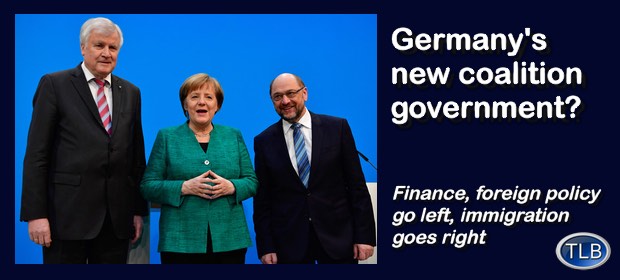
Germany: Merkel Pays High Price for Fourth Term
“This will not be long.”
- “Merkel will govern…but her government will be under the heading ‘this will not be long.’ This refers to Merkel, and also to the fact that in many parts of the country there is the feeling that ‘this’ should not continue.” — Kurt Kister, Editor-in-Chief, Süddeutsche Zeitung.
- “The CDU retains control of the beautiful-sounding, but in fact powerless, Ministry of Economy, the unpopular Ministry of Health, the crisis-prone Ministry of Defense and the shadowy existence of ministerial posts in the Chancellery, for education and agriculture. That is little for the strongest faction in the Bundestag.” — Editorial, Münchner Merkur.
- “The CDU was transformed into Merkel’s own personal political party. On the way, though, the competition of political ideas—the policy conflicts that are the lifeblood of democracy and which provide voters with direction—was lost.” — René Pfister, head of the Berlin bureau, Der Spiegel.
Negotiators from Chancellor Angela Merkel’s center-right Christian Democratic Union (CDU), their Bavarian partners, the Christian Social Union (CSU), and the center-left Social Democratic Party (SPD) have agreed in principle on a deal for a new “grand coalition” government—one that, in fact, is the same as the one that governed prior to the last election in September 2017.
The deal, if formally ratified by the SPD’s rank and file members at a special party congress on March 4, would ensure that Germany has a new government by Easter—and that Merkel, already in power for 12 years, will remain in office for a fourth tenure as chancellor, albeit in a much-weakened position.
Unusually, the 177-page agreement, reached on February 7, is subject to review in two years, when the parties will reassess the coalition. Analysts have speculated that it may be an opportunity for Merkel finally to step down.
 German Chancellor Angela Merkel (center), stands with Martin Schulz (right), the leader of the Social Democratic Party, and Horst Seehofer (left), Governor of Bavaria and leader of the Christian Social Union, after government coalition negotiations on February 7, 2018 in Berlin, Germany. (Photo by Carsten Koall/Getty Images) German Chancellor Angela Merkel (center), stands with Martin Schulz (right), the leader of the Social Democratic Party, and Horst Seehofer (left), Governor of Bavaria and leader of the Christian Social Union, after government coalition negotiations on February 7, 2018 in Berlin, Germany. (Photo by Carsten Koall/Getty Images) |
To ensure the deal, the three parties made concessions to each other, all in an effort to prevent fresh elections in which the anti-immigration party Alternative for Germany (AfD), riding high in the polls, would almost strengthen its position in the German parliament, where it already is the main opposition party.
Merkel’s greatest concessions involved the allocation of cabinet positions. Her CDU relinquished control over the influential Interior and Finance ministries. The SPD will now control the three top ministries: finance, foreign affairs and labor. The CSU, which advocates a harder line on immigration than Merkel, will take over the Interior Ministry.
The key points of the deal included agreements on healthcare and housing reform; a commitment to international climate goals; a “billion-euro program” to ensure that all Germans, including those in rural areas, have access to a high-speed internet connection by 2025; and restrictions on German arms exports to all countries taking part in the war in Yemen. The restrictions would include Saudi Arabia, a key market for German defense companies.
With respect to the European Union, the CDU/CSU and SPD agreed to grant more powers to the European Parliament and to create a European Monetary Fund—presumably funded in large measure by Germany—to help protect the eurozone against future financial crises. More significantly, the agreement promises “more investment” for the European Union. The SPD said this amounted to “an end to austerity measures”—cuts to public spending—imposed on the European Union by Germany after the eurozone crisis.
On the most contentious issue, namely that of immigration, the CDU/CSU and SPD agreed to cap the number of asylum seekers coming to Germany at between 180,000 and 220,000 per year. Merkel has long resisted an upper limit on asylum seekers, as demanded by the CSU, but after a million CDU voters defected to the AfD in the last election, she agreed.
The coalition deal also caps the number of migrants brought to Germany through family reunification (Familiennachzug) visas at 1,000 per month for those with so-called subsidiary protection, a temporary protection that falls short of full asylum. The category usually involves migrants fleeing war-torn countries but who cannot prove that they personally face any immediate danger. “Subsidiary protection applies when neither refugee protection nor an entitlement to asylum can be granted and serious harm [torture or death penalty] is threatened in the country of origin,” according to the Federal Office for Migration and Refugees.
On closer examination, however, the compromise appears to be cosmetic: most of those under subsidiary protection in Germany are not married and do not have children; according to German law, they would not be allowed to bring extended family members in any case. Moreover, those under subsidiary protection involve a relatively small percentage of the migrants in Germany.
Only 200,000 of the more than two million migrants who have arrived in Germany since 2015 are under subsidiary protection, according to the Federal Employment Agency. Of those, between 50,000 and 60,000 have applied for family reunification.
In any event, the cap makes exceptions for “humanitarian grounds,” prompting SPD leader Martin Schulz to describe the agreement as a “1,000-plus regulation.”
In other words, the “compromise” that supposedly limits the number of family reunifications appears to be a public relations gimmick aimed at persuading German voters that the mainstream parties are taking a harder stance on migration, apparently in an effort to blunt voter appeal for the AfD.
The coalition deal was met with considerable skepticism from across Germany’s political spectrum.
A poll conducted for Die Welt on February 8 found that 63%—almost two-thirds of voters—believe that Merkel was “weakened” or “clearly weakened” by the outcome of the coalition negotiations. Only 16% said the chancellor “strengthened” or “clearly strengthened” while 18% said she was neither strengthened nor weakened.
Many commentators said the agreement foreshadowed the beginning of the end of the Merkel era.
The Editor-in-Chief of Süddeutsche Zeitung, Kurt Kister, described Merkel’s new cabinet as “a government with an expiry date.” He wrote:
“Yes, there were no winners in these coalition negotiations—just as there was no clear winner in the Bundestag election. Maybe the CSU has done the best. Party leader Horst Seehofer, who has nothing left to lose, will be the most important minister [Interior Minister] of the CDU/CSU. Seehofer’s upper limit for immigrants now stands as a corridor in the coalition paper: His party (and the CDU) will politically benefit from the upper limit, which corresponds to the ideas of a majority of Germans and also represents the limit of what important parts of the SPD will accept. The SPD has also achieved a lot in the short coalition negotiations, especially by gaining control over the major ministries.
“If a majority of SPD members do not oppose the coalition deal, Angela Merkel will have achieved her most important goal: there will be a (relatively) stable government. If the fourth Merkel cabinet comes about, it will be similar in some respects to the last cabinets of Helmut Schmidt and Helmut Kohl. Merkel will govern…but her government will be under the heading ‘this will not be long.’ This refers to Merkel, and also to the fact that in many parts of the country there is the feeling that ‘this’ should not continue.”
The Berlin correspondent for Deutsche Welle, Volker Witting, wrote:
“Merkel knows that her fourth chancellorship will probably be the last. Even before the federal election, it had taken her long time to decide on running for a fourth term. And not only the opposition is pushing for renewal. Some in the CDU are counting on Merkel leaving—better sooner than later; even if the critics say that only behind closed doors.
“Above all, the right wing of her party cannot forgive Merkel for moving the once conservative CDU far in a liberal-social democratic direction. Conservatives have been grumbling for a long time, but few express their displeasure openly, even though they are thinking about an end to the Merkel era. For instance, Schleswig-Holstein Prime Minister Daniel Günther recently said: “A new government must include individuals who have a perspective for the post-Angela Merkel period.”
The Münchner Merkur, in an article entitled, “CDU grumbles about Merkel: ‘One could hardly have negotiated worse,'” wrote:
“The draft agreement could secure Merkel’s political survival, but puts pressure on her internally. The price for the agreement with the SPD and CSU is relinquishing the most important ministries. Foreign affairs, finance, labor—all gone. The CDU retains control of the beautiful-sounding, but in fact powerless Ministry of Economy, the unpopular Ministry of Health, the crisis-prone Ministry of Defense and the shadowy existence of ministerial posts in the Chancellery, education and agriculture. That is little for the strongest faction in the Bundestag.”
Germany’s largest-circulation newspaper, Bild, in an article entitled, “Help, I have shrunk the CDU!,” documented a growing rebellion against Merkel from within the CDU. Reaction to the coalition agreement included comments such as: “a political mistake,” “completely unacceptable,” “our own party is being wiped out,” “it bears the handwriting of the SPD,” “devastating,” and “not good.” Bild wrote: “The fact is: The CDU has lost more influence in the new government than it has gained. The Merkel critics in the CDU camp are getting louder.”
CONTINUE READING HERE
ER recommends other articles by The Gatestone Institute
About the author
Soeren Kern is a Senior Fellow at the New York-based Gatestone Institute. Follow Soeren Kern on Twitter and Facebook
Featured image: Tobias Schwarz / AFP




